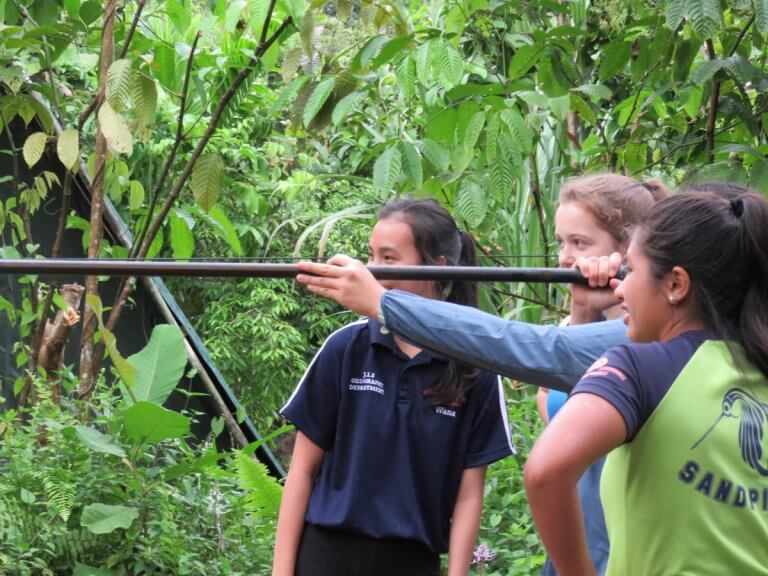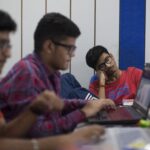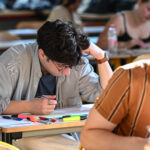
“It is amazing how dispiriting it can be to enter a learning environment and to be made immediately to suppress your own exploratory inclinations. We owe it to ourselves and each other to create better opportunities that enhance human potential and education is the externality that allows for this.”- Ashim Shanker
When you were a young student, you too will have possessed an eagerness to explore through engaging educational tools and techniques.
But if you were ever stuck in a learning environment that didn’t permit students to flourish or grow through innovative and stimulating activities, it’s highly likely that you’d have feel disheartened or distracted from your academic development.
That’s why exploratory learning is an essential part of modern school curricula. By leveraging this investigative education style, students unleash the power of their imagination and take their future to new heights.
Understanding the need for creative stimulation, many international schools have implemented a variety of opportunities for learners to explore their passions and enhance their interests in outdoor and co-curricular education.

Source: British International School Phuket
From playful learning labs to contemporary makerspaces, there’s always a new way to inspire pupils to think outside of their comfort zone and be daring enough to create without rigid restrictions.
As Dr Clive W Kronenberg explains, “In the global educational domain there has been, for several years already, a pronounced focus on developing critical thinking in schools and learning institutions. Although there’s wide consensus that critical thinking can enhance the learner’s general performance levels effectively.”
In order to develop their inquisitive nature, “Learners should be asked routinely to express their own points of view on a diversity of issues, concepts and ideas. Also, they should be given tasks that call upon them to develop their own categories and modes of classification, rather than the teacher providing such possibilities in advance,” Kronenberg adds.
This is where explorative learning practices come into play. By providing a safe space for young minds to curate ideas and collaborate with peers on creative tasks, they’ll feel part of a community of progressive pioneers and 21st-century creatives.

Source: Australian International School Singapore
Here are four explorative international schools that value student innovation…
AUSTRALIAN INTERNATIONAL SCHOOL – SINGAPORE
Supporting and influencing a community of international learners to excel beyond their academic pursuits and across all areas of their development, Australian International School (AIS) in Singapore understands the need for student-led discovery and explorative education.
At AIS, learning is not confined to the classroom. Through the International Baccalaureate Primary Years Programme (PYP), students from ages 6 to 12 are exposed to a dynamic learning environment where they can actively enquire, build on their understanding of the world and take responsibility for their academic progression.
Explorative in nature, all AIS programmes build upon learners’ enquiry-based skills and enable them to view the world through different lenses.
From the Early Years curriculum that draws on the principles of the Reggio Emilia philosophy, to the Secondary Years syllabus that promotes the Australian HSC, the IBDP or Vocational Education and Training options; every student at AIS embodies the ‘challenge by choice’ ethos.

Source: Australian International School Singapore
Inspiring ingenuity, AIS students are also coaxed to step out of their comfort zones and try new things.
Either by fully engaging in the School’s Outdoor Education Programme, introducing them to community service projects, enriching their cultural perspective with global languages programmes or involving them in inclusive co-curricular groups and events, the Australian International School in Singapore is where every student’s ambition is nurtured and realised.
Find out more about the school here.
BRITISH INTERNATIONAL SCHOOL PHUKET – THAILAND
The British International School Phuket (BISP) has developed a unique education philosophy based upon a ‘Triple Helix’.
Many schools rightly identify ‘wellbeing’ as an important aspect of general education, but BISP has also incorporated ‘Passion’ into its philosophical approach. ‘Passion’ it defines as the ‘ability to embrace life’, as evidenced by students seizing opportunities to take learning out of the classroom and into the world.

Source: British International School Phuket
Such a commitment requires the school to provide opportunities for students to seek their own challenges, building on their existing knowledge and experiences. Examples of this in the Primary School include charitable projects devised by children through the ‘Make a Difference (MAD)’ campaigns and their work with less privileged children.
In the Secondary School, an ‘academy’ structure provides real-life experiences in business, science, the arts and technology, where students take their own passions beyond the classroom and contribute to school development through practical enterprises.
Examples include the technical back-up and live-streaming of sports and arts events, business ventures based upon retailing school-related items, the construction of buildings using materials designed out of recycled materials and the production of commissioned artwork for commercial use. Notable successes include the student-sponsored support for a scholarship student from rural India to attend BISP, and the design of an ‘app‘ to facilitate charitable giving.
Compassion lies at the heart of the educational process, and this school prides itself on encouraging students to demonstrate this attribute through innovation and creativity.
JERUDONG INTERNATIONAL SCHOOL (JIS) – BRUNEI
Jerudong International School in Brunei, on the northern coast of Borneo, offers a British International education to 1,650 day and boarding students.

Source: Jerudong International School
The IB Diploma course incorporates the ‘Theory of Knowledge’ (ToK). This builds on the Philosophy for Children (P4C) programme in the Junior and Middle Years of the school. ToK encourages critical thinking and asks the question, “How do we know what we know?”
IB Diploma students spend a residential weekend in Temburong, a protected area of Brunei, with the Iban tribal people. They learn how the Iban people acquire knowledge; is it different to Western learning? They listen to the village elders – a tradition of storytelling. What is the value of modern technology in such a traditional setting? These are the questions asked.
Students go into the primary rainforest – jungle – to learn about plants used for food and medicine. Here, students realise the value of indigenous knowledge as collectively, six guides share information on the rainforest being a self-sustainable environment.
They learn that Borneo is home to over 15,000 plant species, with over 6,000 species found nowhere else in the world. Some of the most incredibly valuable species with amazing uses are found here in Borneo, such as the Kulimpapa, a plant capable of acting as an insect repellent, whereas the Gaharu tree, which produces essential oils for the perfume industry, can be worth as much as USD$15,000 at full growth.
This is learning in an innovative and truly explorative manner!
SEOUL FOREIGN SCHOOL (SFS) – SOUTH KOREA
Inspiring excellence and building character since 1912, Seoul Foreign School (SFS) in South Korea combines an exquisite campus with an extensive range of arts, athletics and aquatics facilities.

Source: Seoul Foreign School
By integrating innovative education practices from around the world, SFS supplies learners with two international curriculums: the International Baccalaureate and the English National Curriculum. Yet, within each curriculum, the focus is on creativity, teamwork and adaptability.
Through the comprehensive arts programmes, the school provides an explorative environment for visual arts, music and drama students to take centre stage and perform.
For instance, in their visual arts programme, learners from the bottom to the top of the curriculum pyramid have bright and open-space classrooms to brush up on their artistic skills. Encouraged to experiment with Korean art styles and contemporary 3-D printing, there’s never a shortage of innovative assembles to arise from SFS.
In addition, the school is made up of a mix of students from numerous nations and international curricula, and has evolved into a home away from home for many learners. Driven and diverse, this enables students to explore an enriched view of the world.
*Some of the institutions featured in this article are commercial partners of Study International
Liked this? Then you’ll love..
See your child excel at the British International School Phuket
How JIS Brunei enabled these students to enter the world’s elite universities







